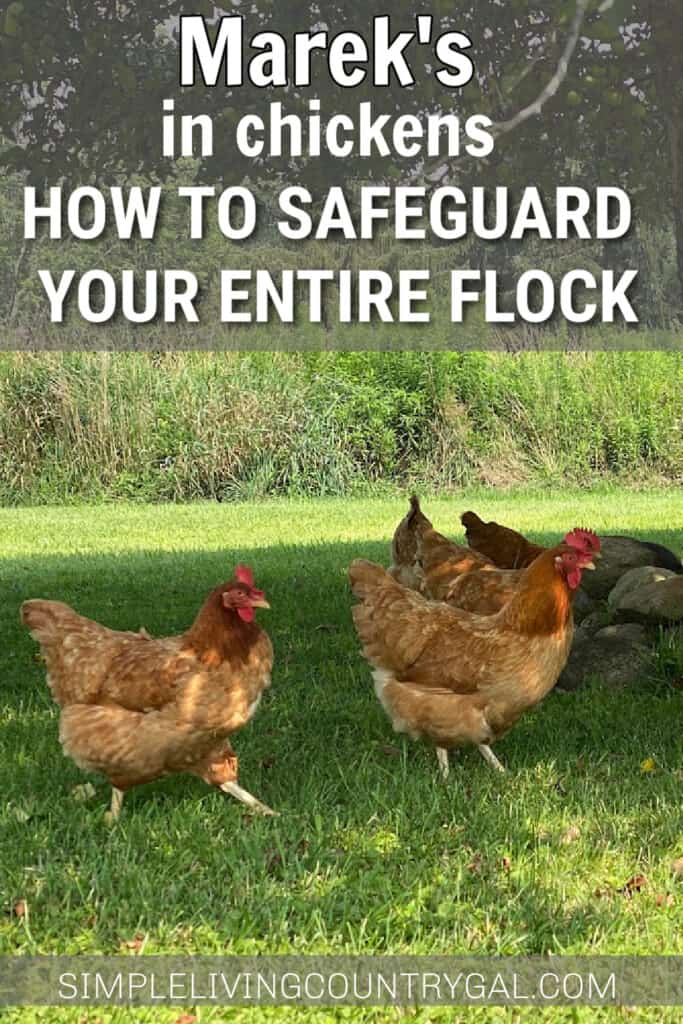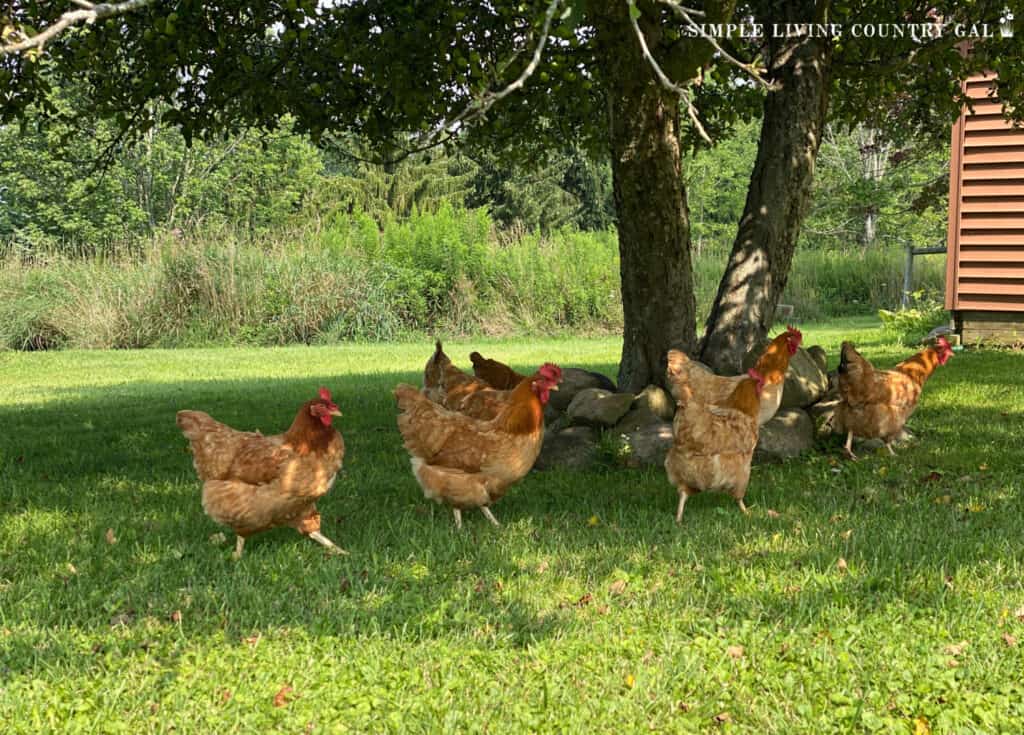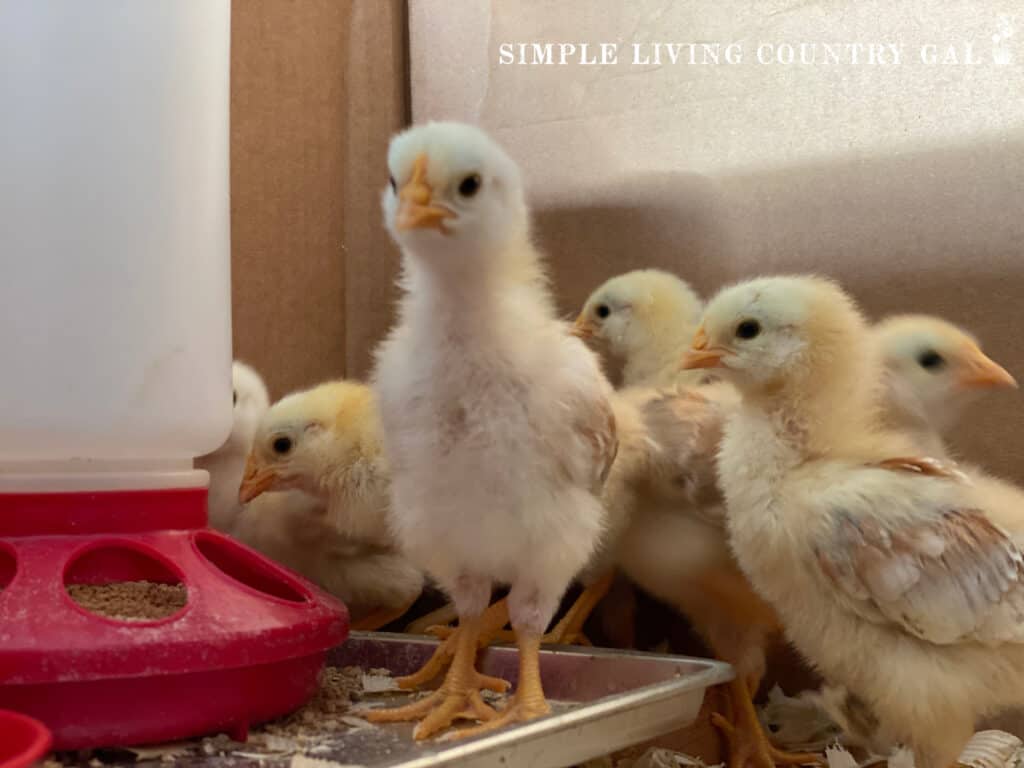Marek’s Disease in Chickens
Raising healthy chickens is a goal of any homesteader, and knowing what can hit our flock can help us catch things early on. This article will introduce you to Marek’s Disease in Chickens. What it is, symptoms to watch for, and basic care.
Raising chickens that are healthy and happy will ensure you have farm fresh eggs to enjoy all year long.

Before we dive in, let’s talk about what this illness is so you have a basic overview of what to watch out for and how it spreads in a flock.
Marek’s Disease in Chickens
Marek’s Disease is a viral disease that is caused by a herpes virus and targets the nervous system of the bird. This often leads to paralysis, tumors in vital organs, and, ultimately, death. You can read more on Marek’s disease here.
Marek’s disease is highly contagious and can quickly spread through a flock by dust in a coop. Luckily, it is also easily preventable, which we will talk more about in a bit.
It is most commonly seen in younger birds between 10 and 25 weeks old, but older chickens can also become sick with it. Understanding Marek’s disease is important because early detection and management can help contain it before it becomes widespread.
Marek’s disease is one of the most common diseases in backyard flocks, and unfortunately, once signs are visible, it is usually no longer treatable. That means preventing the disease is a top priority for backyard chicken owners.

The importance of preventative care in chickens.
The health of our chickens, no matter what size the flock, is important not only for our peace of mind but also for the overall productivity. Healthy chickens lay more eggs, are more robust, and better able to withstand diseases.
Having a routine for coop care and maintenance as well as individual chicken inspection will go a long way to a thriving and healthy flock.
SLCG Pro Tip: When feeding your chickens take the time to watch each of your birds. See if anyone is lagging bag, acting suspicious, or walking differently. These signs may be subtle so being familiar with your flock is a great way to stay on top of their care.
More Chicken Health Reads:
How do chickens get Marek’s disease?
Marek’s disease is caused by a herpes virus that quickly spreads through the flock in feather dander and coop dust. When healthy chickens come into contact with contaminated dust or breathe in dander from infected birds, they can contract the disease. The virus can also spread through the feces and saliva of infected birds. Once a chicken is infected, the disease can remain dormant for several weeks before symptoms appear.
A scary thing to know is the virus can linger in a coop for many months, even after an infected bird is removed. This can keep the risk of infection high to other hens in the flock.
Disclaimer: In accordance with FDA guidelines, the information and products offered on this website are not intended to diagnose, treat, cure, or prevent any disease. I am not a medical professional. Before administering any medications to your animals please contact a veterinarian first.
Chicken Water Heater 15 in for 5 Gallons Chicken Drinker, 125W Poultry Waterer Heated Base with Thermostat and 9.8ft Power Cord for Metal Drinking Fountains Chicken Coop


Symptoms of Marek’s Disease
The symptoms of Marek’s disease vary from bird to bird. However, these are the most common to watch for.
- Affected birds often display neurological signs such as paralysis of the wings, legs, or neck.
- They may also exhibit a loss of weight, depression, irregular pupil size, and changes in feather color or eye color.
It’s important to know that not all infected birds show symptoms. Remember, always consult a veterinarian if you suspect Marek’s disease in your flock.

Treatment for Marek’s Disease
Unfortunately, there is no definitive cure for Marek’s disease once a bird is infected. The nature of the disease makes it resistant to antibiotics or other common poultry medications. Treatment is mostly supportive care, which can include supplemental nutrition and hydration, as well as making the bird as comfortable as possible.
Steps to Take if You Suspect Marek’s Disease
If you suspect Marek’s disease in one or more of your chickens, immediately call your vet. It’s true not all vets treat chickens, but they will help you over the phone with advice and support.
- Consult with a Veterinarian: Always work closely with a veterinarian either in person or by phone. Ask questions until you understand the answers, and administer treatment as advised.
- Isolate the Bird: To prevent the further spread of the disease, immediately move the infected bird to a separate area away from the rest of the flock.
- Provide Supportive Care: Since there is no cure, focus on providing supportive care that includes good nutrition and plenty of water. Administer any recommended treatments prescribed by your veterinarian.
- Clean and Disinfect the Coop: Deep clean and disinfect the coop thoroughly to eliminate any lingering virus. Be sure to clean all feeders, waterers, and other equipment as well.
- Monitor the Flock: Keep a close eye on the rest of your flock for any signs of the disease. Early detection will help manage the spread to the rest of the flock.
Remember, prevention is always better than cure. Vaccinate your flock against Marek’s disease and maintain biosecurity measures to limit disease transmission.
Disclaimer: In accordance with FDA guidelines, the information and products offered on this website are not intended to diagnose, treat, cure, or prevent any disease. I am not a medical professional. Before administering any medications to your animals please contact a veterinarian first.
How to Prevent Marek’s Disease
Vaccination is the best approach to prevent Marek’s disease and needs to be given in day old chickens before they are exposed. Most hatcheries give this vaccination routinely in birds before shipment but I suggest you confirm it before you place an order.

Another point to know is that while the vaccine prevents the onset of symptoms and tumor development, it does not prevent the birds from becoming infected with the virus if exposed and spreading it to others. Be vigilant by keeping a clean and well-ventilated coop year round to limit the spread of the virus.
More to Know About Marek’s
- Marek’s disease is not transmittable to people .
- Once a chicken gets Marek’s it is infected for life.
- Lighter weight birds seem to be more susceptible like Silkies and Leghorns.
Marek’s disease can be scary for many chicken owners but knowing what it is and how to prevent it can help calm our nerves. Knowledge is your best defense. Understanding the disease, its symptoms, and how it spreads can help you protect your flock. Remember, day one vaccination, daily inspecting your flock, and maintaining a clean coop are all important to keeping this disease away.
More Chicken Care Resources:
- How to Keep a Clean Chicken Coop
- DIY chicken coop all-purpose cleaner
- How to Deal With a Wet Chicken Run




